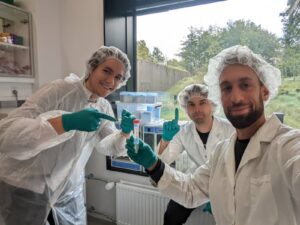Accelerace invests in cultivated meat technology
Share:

Climate change has taken its hold of the globe, and one of the bigger factors in humans’ impact on the planet, is meat production. From CO2 emissions to deforestation, our consumption of meat, has a huge influence on our climate.
Meat alternatives have mostly been considered the solution to our heavy meat consumption. But, it might not be the only one. Scientists have been working on cultivating meat, i.e. growing meat in a lab. Cultivated meat is made from stem cells. They are grown in a controlled environment, and when they are ready, you “tell them” to become muscle cells. The muscle cells can later be harvested and then combined with fat cells to create the cultivated minced meat.
But, the problem, as with many new innovations, is cost of scale. At the moment, meat cultivation is extremely expensive, and thus it would never make sense as a substitute for meat from animals. But, if it was financially viable it could be a welcome help to our environment. The numbers are not final, but Meat Tomorrow’s indications show a 52% reduction in CO2 emissions and 72% reduction in land area usage.

One of the reasons it is so expensive, is because of the time it takes to grow the cells. But, two Danes are closing in on the recipe for cultivated meat that can rival supermarket prices on traditional meat. They have found a way for growth speed to double, therefore being able to harvest quicker, and thus produce more in a shorter time. Meat Tomorrow are primarily focused on minced pork at the moment, e.g. for sausages and other mince products, but the concept can easily be expanded to beef.
“The technology development already achieved by Meat Tomorrow is remarkable, even on a global scale. With their new approach to meat cultivation, they have achieved something that so far has been impossible.” – Mads Løntoft, Venture Partner at Accelerace.
CEO, David Valbjørn and CSO, Matias Ankjær, have been working on the solution since 2020. At the time, Matias was working on stem cells in research for a cure to Parkinson’s disease – an area that isn’t technologically far removed from what is needed to create the stem cells that go into cultivated meat. They asked themselves why the technology had not been used in meat cultivation, and from there they have now come to a place where the first edible products are within sight.
Accelerace have joined the round alongside both DanBan and Keystones. Meat Tomorrow will be using the the runway from the investment to finalise the product, and the aim is to have the first actual sausage produced in 2025.